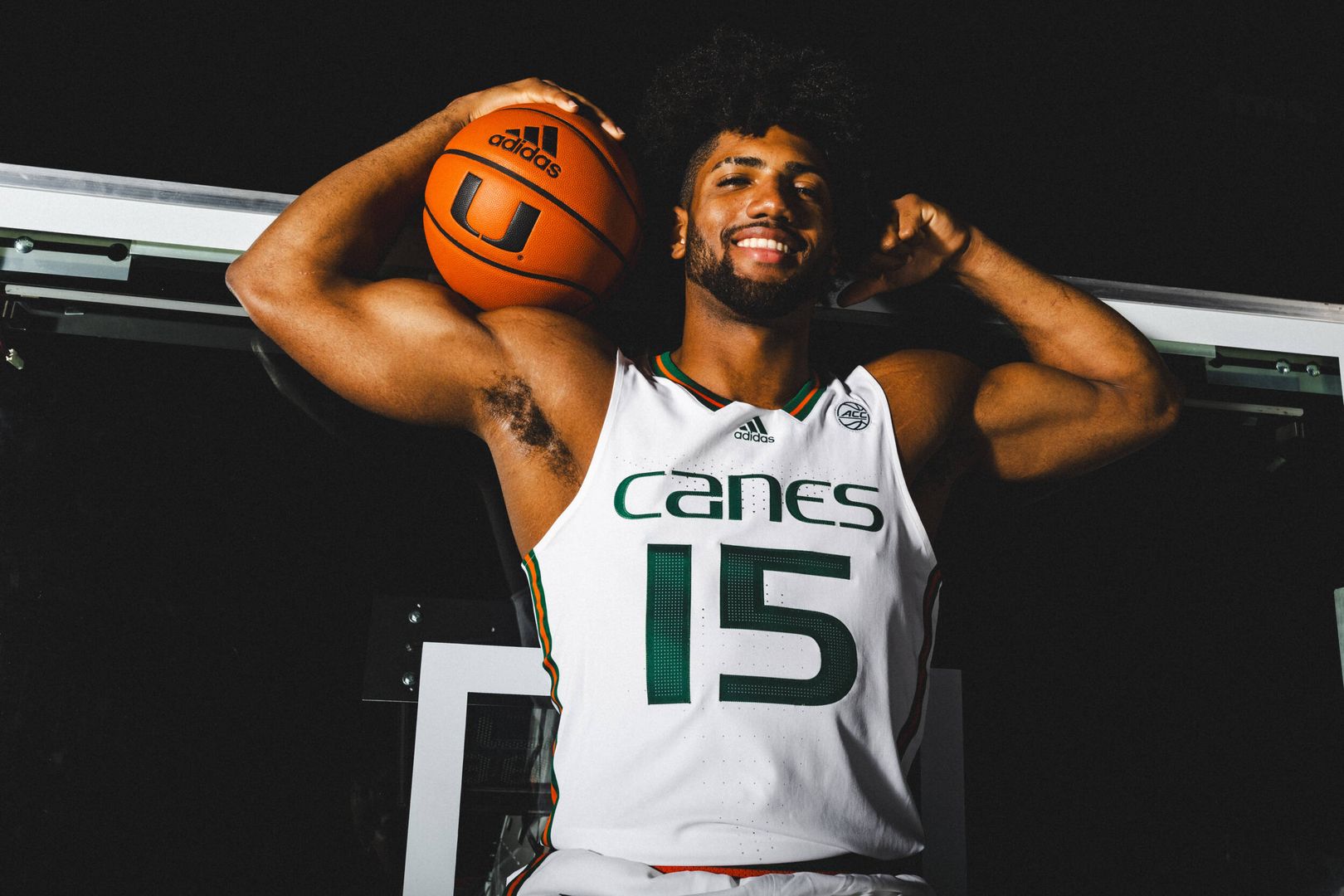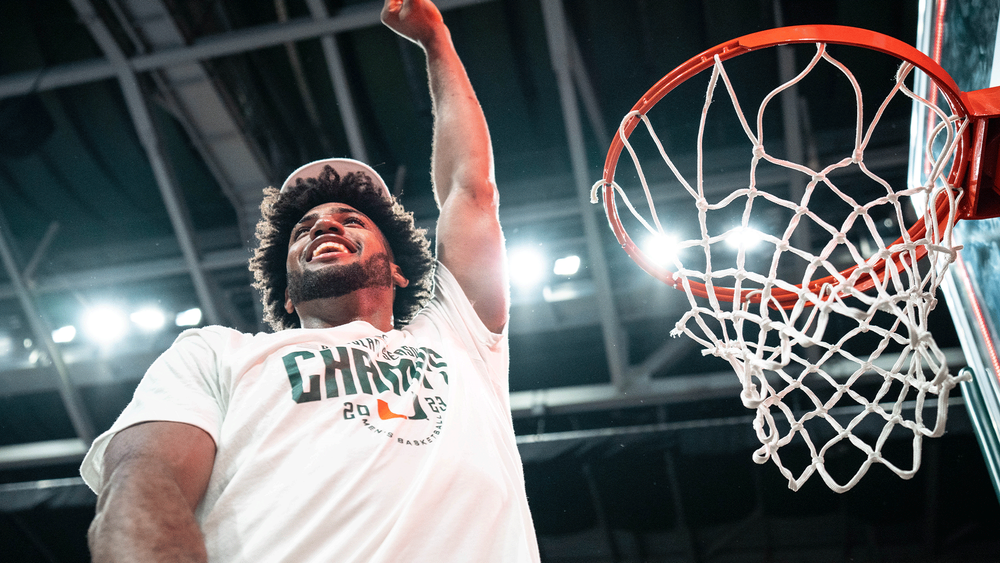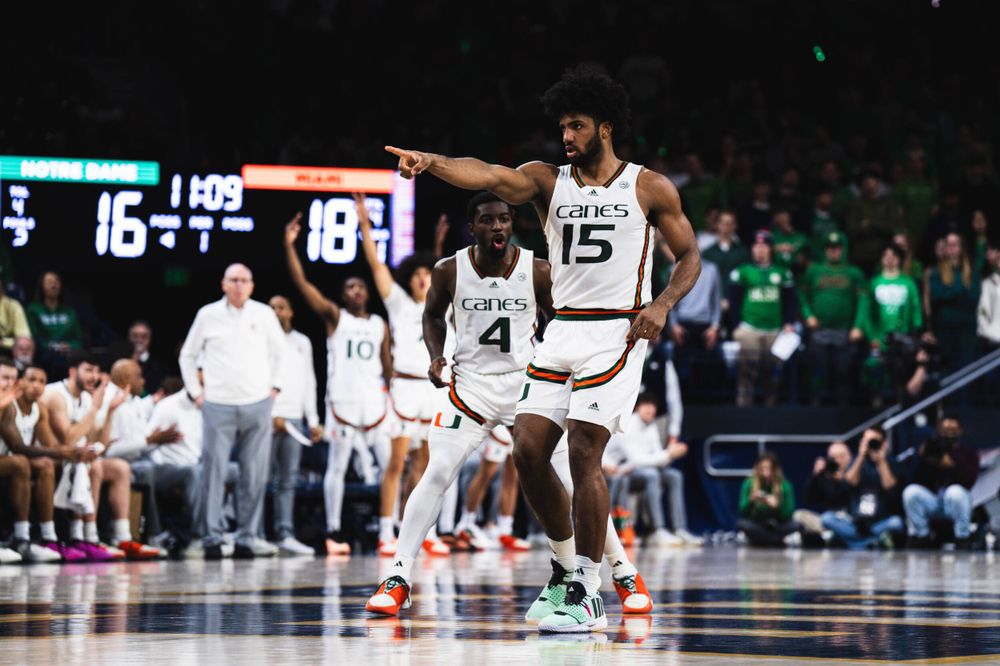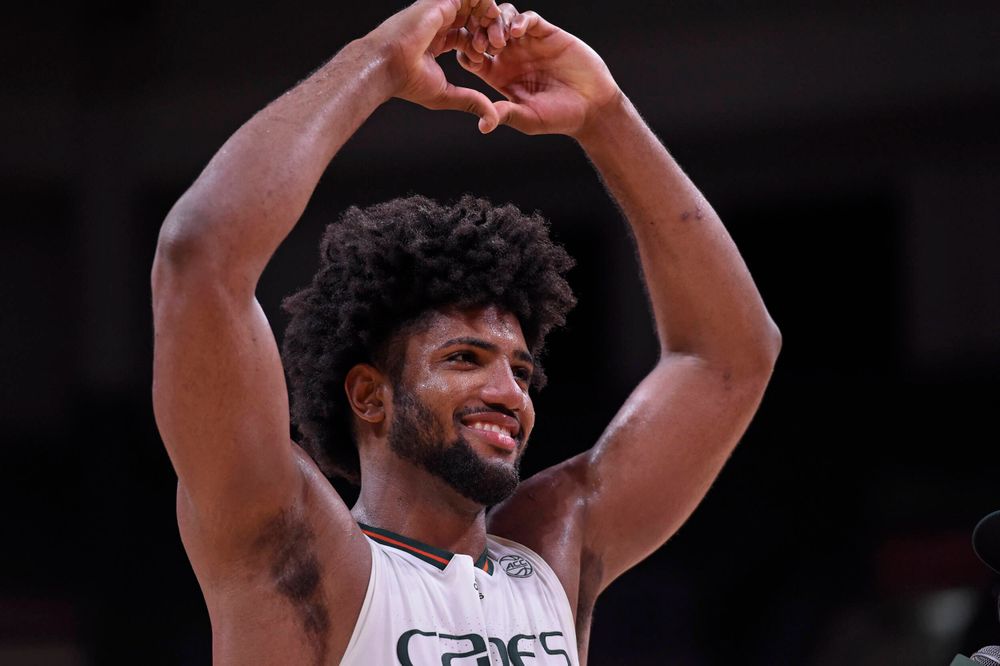
Chasing a Dream: Norchad Omier
This story originally appeared in the Winter 2024 edition of Hurricanes Magazine.
CORAL GABLES, Fla. – A lot had changed for Norchad Omier since he’d last visited home.
He made history as the first Nicaraguan-born basketball player to earn a Division I scholarship. He had a breakout season at Arkansas State, where he earned recognition as both the Sun Belt Player of the Year and the Sun Belt Defensive Player of the Year.
He challenged himself by transferring to Miami where he quickly endeared himself to not only his teammates, but the South Florida community. And in March, he helped the Hurricanes make history of their own when they advanced to the Final Four for the first time.
Given all of that, Omier expected there might have been a little bit of a buzz this past summer when he returned to Nicaragua for the first time in two years.
Turns out, the welcome was warmer than he could have ever imagined.
“It was so different. A lot of people know me now,” Omier recalled with a chuckle. “They see me on the street and ask me for photos. That was a little bit weird. I thought I would just go home, have fun with some of my family and relax. It turned out to be a little overwhelming, but it still made me feel good because I know I’m doing good things.
“It was nostalgic, too. … It’s been a long road from where I was a couple years ago to where I am now. I’m just thankful to the Lord and I’m happy. But I can’t get comfortable at the same time. Still, it’s all shown me that no matter where you come from, if you can dream big and work hard for it, anything is possible.”
Omier, a 6-foot-7 big man for the Hurricanes, has become a testament to the power of big dreams and hard work.
He grew up a baseball-playing phenom in Bluefields, a port and seaside community in eastern Nicaragua. He always figured his strength, size and power on the pitching mound would open doors for him and pave the way for him to potentially, become a professional athlete.
But everything changed when those same attributes caught the attention of a local basketball coach who happened to stumble on a casual baseball game Omier was playing with his friends.
The coach got out of his car, asked Omier if he’d ever considered basketball and before long, Omier found himself at a camp in Nicaragua trying to learn the ins and outs of a sport that, to that point, he’d only occasionally played on nearby neighborhood courts and playgrounds.
Despite his athleticism and height, basketball didn’t come easy.
Omier struggled, initially, with dribbling and ball movement. Shooting didn’t come easy either.
But after a year of training, he noticed a shift.
“I was just figuring stuff out, but then, my second year, I was winning scoring championships in my hometown,” Omier said. “Best rebounder, best free throw shooter. When all that started to happen, my second year playing, I was like, ‘Damn, that’s crazy.’ I didn’t know I could pick it up so fast.”
Before long, the dream of playing professional baseball was replaced by the dream to play professional basketball. The next question Omier faced was how to make that dream a reality.
There were thoughts of playing in Mexico before a visit to South Florida changed things.
While in Miami with Wesley Savery – one of his mentors and the former vice president of the Basketball Federation of Nicaragua – Omier attended a basketball camp where he earned recognition as the event’s most valuable player.
In attendance at the camp was Art Alvarez, the coach at post-graduate Miami Prep.
Omier made an immediate impression and Alvarez knew he wanted the big man on his roster.
After conversations with Omier, his family and Savery it became clear: Mexico was out of the picture. Omier would attend Miami Prep and hopefully, earn himself a college scholarship in the process.
At Miami Prep, Omier notched a double-double in all 46 of his appearances. He averaged 26.7 points and 20.3 rebounds and led his team to a 41-5 record – and did it all while battling homesickness and even wondering if he’d made the right decision in coming to the States.
His family – including his father Halstead, his mother Norma, and his siblings Bezaleel and Anesha – encouraged him to stay strong.
“In the beginning, I was like, ‘Yes, Mom, I want to go. Yes, Dad, I want to go.’ There was no question,” Omier said. “But when I got here, that’s when it hit me and that’s when it became hard. I spoke with them every day to stay close to my family. That helped. They always reminded me to never forget about God, to pray every day and to keep working hard for my dream.”
Omier powered through his personal discomfort, but another challenge loomed.
The COVID-19 pandemic took its toll on every part of life, including college basketball recruiting.
He wasn’t able to visit any of the schools expressing interest in signing him and coaches weren’t able to see him play in person.
Omier ultimately signed with Arkansas State, where he played for then-Red Wolves coach Mike Balado, a Miami native who spoke fluent Spanish.
That comfort level helped Omier transition to the college game and just as he had in Bluefields, and just as he had at that camp in Miami, the forward made an impact immediately.
In his first season at Arkansas State, he averaged 12.6 points, 12.3 rebounds, 1.2 steals and 1.4 blocks in 23 games. He was honored as the Sun Belt Freshman of the Year and earned a spot on the All-Sun Belt First Team.
He returned to Nicaragua that summer to compete with the Nicaraguan National Team and later, as a second-year freshman at Arkansas State, averaged 17.9 points and 12.2 rebounds.
It was after that season – and after being recognized as his conference’s top player – that Omier wondered if it was time to challenge himself and play at a bigger program.
He entered his name into the transfer portal and Florida State, Georgetown, West Virginia, and Texas Tech were among the programs who expressed interest.
But a trip back to Miami, a conversation with head coach Jim Larrañaga and some time with the Hurricanes made it abundantly clear: he belonged in Coral Gables.
“There were a lot of factors – the coaching staff, the teammates. Even on my visit, they made me feel like I was already one of them. They made me feel like I was in the right spot. There were a lot of factors and Miami checked all the boxes,” Omier said. “And Coach L, he was more than a coach. I saw that he was a teacher. He showed me. … From day one, he told me, ‘I’m not one of those types of coaches that yell and get up in your face. If you don’t know something, I’m going to show you the right way to do it.’ He was more like a teacher than a coach and I really liked that.”
Miami, it turned out, really liked Omier, too.
He quickly settled in, both on his new team and in his new home.
In his first season with the Hurricanes – and his first season in the ultra-competitive ACC – he averaged 13.1 points and 10.0 rebounds, along with 1.3 assists, 1.1 blocks and 1.1 steals.
He notched a team-best 16 double-doubles and earned a spot on The Associated Press All-ACC second team. He also helped fuel a history-making March Madness run that neither he, nor his teammates and coaches, will forget about any time soon.
More than that, he embraced his role as a pioneer in South Florida’s Nicaraguan community.
He introduced his teammates to Nicaraguan food and before long, noticed he was being recognized while out and about, particularly at Nicaraguan restaurants.
It became commonplace to see his home country’s blue and white flag waving or emblazoned on shirts in the Watsco Center during Miami’s home games. And before long, Omier started seeing his country’s colors on road trips, with fans waiting after games in places like South Bend, Indiana, and Atlanta for the chance to, hopefully, snag a photo or exchange handshakes with the affable big man.
And for his part, Omier tried to oblige the requests as often as he could.
It was something his teammates and coaches understood – and supported.
“He’s such a unique individual,” Larrañaga said. “His personality is magnetic. I mean, he’s really a genuine person who you like being around. He smiles all the time. He’s happy all the time. He engages with everybody. You could be an 8-year-old, he’s going to be friendly to you. You could be an 80-year-old, he’s going to be friendly to you. … I think he takes great pride in being from his home country and I think he takes great pride in coming here and establishing himself as a quality basketball player. I would not be surprised if one day he went back to Nicaragua and had his own basketball camp and tried to help other kids pursue their dream of maybe coming to America the way he did.”
Added Hurricanes guard Nijel Pack, Omier’s roommate, “He’s done a great job of being focused, but also taking in everybody’s support at the same time. I feel like that could be a lot of pressure on one person, knowing so many people are watching you. … He takes the time to take pictures with fans and interact with kids and I feel like he’s using his platform in a really great way. We always joke with him and say he’s going to be the next president in Nicaragua because he gets so much love and things like that. His people always show great support and we’re all really appreciative of that, as a team.”
Last year, when Miami’s history-making run came to an end in the Final Four in Houston, Omier once again found himself with a decision to make.
Was it time to pursue his goal of playing in the NBA or should he return to Miami for another season?
He went through the NBA’s pre-draft process and worked out for a handful of teams without hiring an agent in order to preserve his college eligibility. He went to the G League Combine, where he underwent testing similar to that at the NBA Combine.
But even as he awaited feedback from those in the professional ranks, Omier couldn’t help but feel as if his work at Miami wasn’t finished. Not yet.
“I feel like, first of all, what made me want to come back was that I think we didn’t finish the job,” Omier said. “When you taste victory and you reach so far in the NCAA Tournament, but you come up short, that was one of the reasons that motivated me to come back. We reached so far, but we didn’t finish it.”
With his decision ultimately made to return to Miami, Omier took the knowledge he gained during the pre-draft process and set about continuing to grow his game.
He spent the summer working to better his 3-point shooting. He worked on his defense, particularly on the perimeter. And he tried to improve his ball-handling skills.
All of that, Omier knows, will not only help him become a more intriguing NBA prospect, but will help the Hurricanes as they work their way through the ACC schedule with the hopes of putting together another deep tournament run come March.
He’s also worked to develop his leadership skills and find his voice as one of the veterans in Miami’s locker room.
That, his teammates say, has been a natural progression for him.
“Norchad plays so hard that everybody tends to listen to him,” Pack said. “He’s a person that plays really, really hard and gives his heart out every game. So, it kind of makes it easy for him. He knows what he’s talking about. He has a high IQ. Basically, when he speaks what he feels and what he sees on the court, everybody has the respect to listen to what he’s saying and try to go out and do it to the best of their abilities.”
Said Omier, “For me, being a good leader is about leading by example. Cheer everybody up. Difficult times are going to come, but we have to stick together. Hard times are always going to be there. We have to figure out, together, how to get out of those hard times.”
More than once, Omier has shown his ability to respond to challenges, often doing it with a broad smile.
He learned a new sport when some in his homeland told him to stick with the familiar. He came to a foreign country to pursue his dream of playing basketball and navigated being away from his family. When he excelled in his first two seasons as a college player in the United States, he looked to take his game even further by facing off against opponents in the toughest basketball conference in the country.
Now, he wants to make sure he brings Miami a championship before he sets his sights on the next steps of his basketball journey.
“I just want to win, no matter what. If I get my job done – the dirty work – hit a couple open shots, push the ball down the court, find people open and just have fun with my teammates, then all I want to do is win,” Omier said. “There’s a lot for us to accomplish this year. The regular season, the ACC Tournament, the NCAA Tournament, and then win a national championship, easy as that.”









